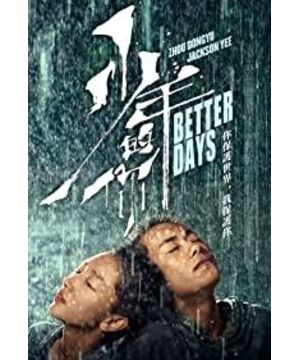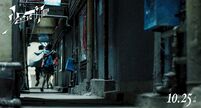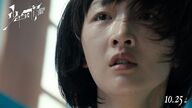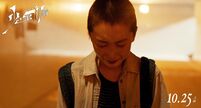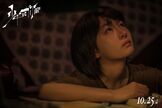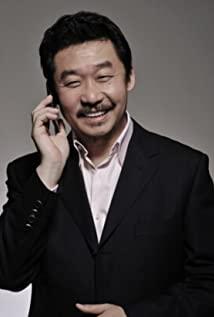I will pay close attention to all the new films that are praised by mainstream film critics as "Chinese Film Hope", from "The God of Medicine" to "The Wandering Earth" to "Captain China" to this one. But to talk about the strengths and weaknesses of such films, the overall development environment of the industry cannot be ignored. Regardless of their advantages or disadvantages, they are all relatively easy to find in the current situation of Chinese films. All the high reputation and popularity are also brought out by comparisons within the industry. Whether it is criticism or encouragement, when one side's speech is relatively dominant, it will erode the opposing side. However, these divergent topics are all discussions outside the content of the film. As far as the film itself is concerned, it is more contradictory, but also more diverse. Let's talk about the advantages first. I have often criticized domestic films for putting too much emphasis on lines and light on camera language. This has existed for many years, whether in youth films or crime films. This makes our movies often only use chicken soup to impress ordinary audiences, and lack of dry goods that can really be put into the movie itself to talk about meaningful. One of the more successful points of this movie is the use of special symbols to convey emotions, and these symbols are closely related to the plot and even reality. The girl who jumped off the building and the heroine moved yogurt. The former finished drinking a bottle of milk and put the bottle back in the basket. The number of bottles corresponds to the number of students in the class. The empty bottle not only indicates the fate of the girl who jumped off the building, but also reflects the complete emptiness in her heart. despair. The director doesn't even need to shoot the face of the girl who jumped off the building. The character setting, emotional foreshadowing, and cause and effect necessary for this background role can all be conveyed through this empty bottle. As one of the detailed descriptions of the real world, the narrative efficiency of this plot is extremely high. Similarly, the composition title mentioned by the virgin protagonist at the end of the film has become an introduction to the deep expectations of the two protagonists. The grading paragraph of the college entrance examination did not make the camera focus on the composition of the heroine, but randomly displayed the answer sheets of different students, which suddenly extended the theme of the story from the two protagonists to the entire group of teenagers. The sealing of the test paper also symbolized that these ideals were buried. . They are too mysterious, like exam papers in a portfolio, out of sight. They are so sensual that only a pen can accurately depict what they really look like. They are so niche that only a few people have the opportunity to read them. They are also too illusory, and they are all locked in cold iron cabinets in the end. Just like reality, the characters in the film often mention that the college entrance examination is an ideal starting point, just as the heroine's mother said "it's over." But together with the college entrance examination, there is still the time of youth. This complex youth cannot be summed up in a single score. Whether all the suffering has come to an end, I think the expression of the heroine when she is hugged by her mother has already answered this question. heroine and hero The tacit understanding reached between them is mixed with the irrational impulses of childhood, a kind of innocence that can really sacrifice oneself for the sake of a lover. In the end, the compromise between the two symbolizes that they leave the youth and eventually grow up. The main creator's attitude towards this kind of growth is complicated. Compromise not only brings about the most eclectic "good ending", but also symbolizes the gradual fading of impulse and rebellion. Just as the beginning and end are repeated many times, "This used to be our Disappeared, and countless umbrellas slowly moved forward until the camera cut into the examination room. The director's use of sound enhances the repressed and tense atmosphere just before the college entrance examination, and at the same time is a preview for the next scene where a corpse is found at the construction site. The emotions are closely linked and not abrupt. These are the real advantages of the movie itself. It is rare for a domestic movie to have so many memorable designs. Although the film has so many advantages that can be discussed, the overall look and feel it brings to me is still lacking. Compared with the unique and exciting parts of the plot, the film also has many things that make people look awkward or playful. place. Next comes the downside. Returning to the topic of "school bullying", even though I mentioned earlier that it is very infectious, it is still ignored and regretted in some aspects. The first is the bullying female leader who is the absolute villain of the film. One of the most obvious problems with this role is the skills of the lines. While it's reasonable for her tone to lean towards hypocrisy due to the character, hypocrisy doesn't mean outright posturing. The feeling of her whole character is a big one, and the language and tone are very similar to the standard animation villain's broadcast tone. Even when she is being interrogated, she still maintains this overly performative tone. Gives a very strong sense of play. Of course, real bullying is often mixed with filthy words. On the basis that swear words need to be harmonized, it is very difficult to create a mean, arrogant and inhuman bully with sarcasm alone, but she is after all. A key character in the film, the distortion of this link has a great influence on the sense of substitution of the entire bullying plot. The second is that the motives of this role are not clear, which leads to the whole bullying incident "with tails and no heads". Some people might say: "Real bullying often doesn't need a reason", but it's not true. Everything has a source. As one of the central figures in the bullying incident, what caused her distorted personality? This question must be answered, whether it is a family link, or a campus or even the entire education system. In the middle section, when the heroine chose to call the police, the bullying girl was suspended from school, her parents came to the school to intercede, beating the child and blaming her for not studying well, this was an excellent opportunity to show the other side of the character, unfortunately, after a similar plot no longer appear. Both good and evil have their origins, and hateful people must have poor backgrounds, but the film doesn't care too much about the portrayal of this character. Even on the later steps, she pretended to beg the heroine, and after getting a response, she just continued to chatter and taunt. , which makes this role a pure villain, the environmental factors that could have been deeply explored and the complexities of human nature. Miscellaneous issues have been completely taken away. This makes "bullying" seem like a gimmick rather than a real core issue to be discussed. The second problem is that the encounter between the male protagonist and the female protagonist is actually based on a very unreasonable plot setting. The female protagonist witnessed the male protagonist being abused on the way out of school. After experiencing the suicide of her friend, she felt sorry for her and decided to help, so she immediately took out her mobile phone and called the police before she was far away from the perpetrator, so she was caught on the spot. There are two problems in this link. The first is that the plot development is too forceful and lacks rationality. Although the heroine is an innocent girl who has never experienced the darkness of society, what she lacks in this plot is the most basic ability to judge danger. When the plot setting does not need to call the police on the spot, this kind of plot can only be considered by me as the screenwriter forcing the hero and hero to meet and choosing to make the heroine stupid. The second problem is that the pace of this episode is too fast. From the time the heroine witnesses the hero being beaten, to her calling the police, and then to her arrest, it only takes about twenty seconds. . In addition, the "someone was beaten here" said by the heroine when she called the police did not include the necessary details such as the address. The whole thing looked very funny. Everything seemed to be forcibly arranged, and the authenticity was greatly reduced. As the first turning point of the plot of this film, and also the premise for the acquaintance of the male and female protagonists, the impact of so many problems in this link is too serious. The next few questions may not be discussed without the censorship factor, and they are also some of the most awkward parts of the film in my opinion. The first is the half hour at the end. If the first half hour of this film is a youth campus film, then the second half hour has completely transformed into a criminal investigation film. What's more fatal is that the core perspective characters are converted with the type. When the male protagonist is arrested in order to help the female protagonist take the blame, the plot already has an ending. Whether it is the character's emotion or the story line, it can come to an end, but I don't know if it is based on the original work (I haven't read it) or to take care of it. The audience's emotions or the response to censorship, the role of the justice police officer who was originally a background character immediately increased significantly, trying to make the male and female protagonists tell the truth and avoid excessive sacrifice of one party. Although this interrogation scene, the psychological defense line of the male and female protagonists has been continuously impacted, paving the way for their subsequent compromise. But in essence, the style of this paragraph has changed dramatically. The fast rhythm brought about by the rapid camera changes in the first half was replaced by a slow emotional narrative, and all the plots were confined to the two small interrogation rooms of the police station. The hero and heroine here have only changed their emotions, and their positions have never changed. And the real emotional change caused by the development of the plot is actually that A policeman, which makes the whole story gradually deviate from the original focus, and the third character walks into this main story based on the relationship between the two. What's more deadly is that at least in the first 20 minutes, the police did not make any changes to the development of the plot, but continued to let the male and female protagonists emphasize the emotions that have been identified. All of these make the trial scene seem long and weird, disrupting the emotional expectations of the audience. In contrast, there is a monologue of the last hostess in the police station of "The Thief's Family". The actor fully revealed the long-buried voice of this character with his acting skills in just a few minutes, thus reflecting the tragic sense of the story. . Here, the police are simply a background board that is unreasonable and unreasonable, a symbol of the indifference of the entire public opinion, rather than a specific character. This question is the same as the second half of "I am not the God of Medicine". When the protagonist completes the shaping of the character arc, there will always be a "finisher" character to find a balance between law and love for them. The cold institutional machine as a whole is unlikely to have this ability, so the role of "finisher" often falls to a policeman with a sense of justice. This should be a characteristic issue of our film industry, after all, until now, our censorship mechanism has not allowed cases of impunity to appear. The relatively stubborn filmmakers in the past chose to be very simple and rude, and a single line of white characters on a black background could reverse the ending. However, in films such as "The God of Medicine" and "Youth of You", which have commercial performance considerations, they have learned to compromise and be flexible. They set the arrest of the protagonist as an original goal, and then set relevant characters to be responsible for guiding them. The mood and emotions of the protagonist thus make such an ending reasonable. Many people think that the compromise ending of the hero and heroine in the last five minutes of the film seems to be the result of a revision. I don't know the truth yet, but in my opinion, with the interrogation scene in the first 20 minutes, even if it is not a revised ending, I will. It can be believed, because the general direction of the entire ending is like this, and it is only a matter of degree that can be changed. However, compared to the traditional one-line censorship solution, new methods like "The God of Medicine" and "Youth of You", I think, do more harm than good. Because it takes the whole "harmonious" ending as the original direction, that "ignoring a line is fine" approach no longer works. In the last five minutes of the film, even if the characters' positions change suddenly, the dialogue in the police car and the scoring scene are an integral part of the film's integrity. You can't rely on ignoring a certain segment to change the theme of the film, otherwise you will get A broken film. In this way, the result of nesting "required content for review" and "what the film should have" is the most incomprehensible result, which means that we are no longer able to Just dancing in shackles, and the shackles have become one with our bodies. The awkwardness of the review is not limited to a single line, it can extend to half an hour. The signals from these films have not been positive for the creative freedom the industry needs. In addition, as I mentioned in the film review of "Galaxy Tutorial", our current reality-themed films are only released after relevant regulations have been introduced. This is why the scenes and objects in the film have been in recent years, but the background is still set in 2011, before the relevant regulations were introduced. Similarly, the unspoken rule that sensitive topics need to hide the real place names also damages the regionality of the film. What's more ridiculous is that the background city of the film is obviously Chongqing, but almost all the characters speak fluent Mandarin with a little Beijing accent. These are the big and small problems caused by the industry or policy, which are the main obstacles to the development of our realistic films, from "The God of Medicine" to "Galaxy Tutorial" to "Heroes of Fire" to "Youth of You", A new set of industry standards is quietly forming, and the public's carnival of the subject just sees the positive side of things. Before a film that breaks this new standard arrives, we should not be too optimistic about everything. 7.5 points Finally, a few controversial issues of plagiarism are mentioned. From my personal point of view, the original author plagiarized and boycotted it, but whether this boycott should be extended to its adaptation is a matter of opinion. As for the main creators who participated in this movie and even the audiences who praised this movie, I don't think there is much to say. Movies are not the product of one family, they are produced as mass cultural consumer goods, and their influence is multifaceted. When a plagiarized work is adapted, it must be clear which part of the problem is wrong. The propaganda must be carried by the distributors, and the selection of materials must be carried by the producers. As for the filmmakers from various industries involved, the screenwriters, directors and technicians who bring original new techniques and contents to the film, I think They shouldn't take the blame. After all, not everyone has seen Keigo Higashino, and not everyone knows who Jiuyuexi is. The main creative team is too large, and we should not jump to conclusions until we investigate clearly who the bad idea came from. As for a larger audience, forget this, it' s just a movie! They should not bear some sins. Buying a 40 yuan ticket will indeed give a few cents to the original author, but how much of the rest will promote the operation of the theater, and how much will promote the development of the entire film industry. We don't know. After all, the movie itself is a multi-contradictory thing, but since you want to evaluate a movie, it is the most basic requirement to finish it.
View more about Better Days reviews


